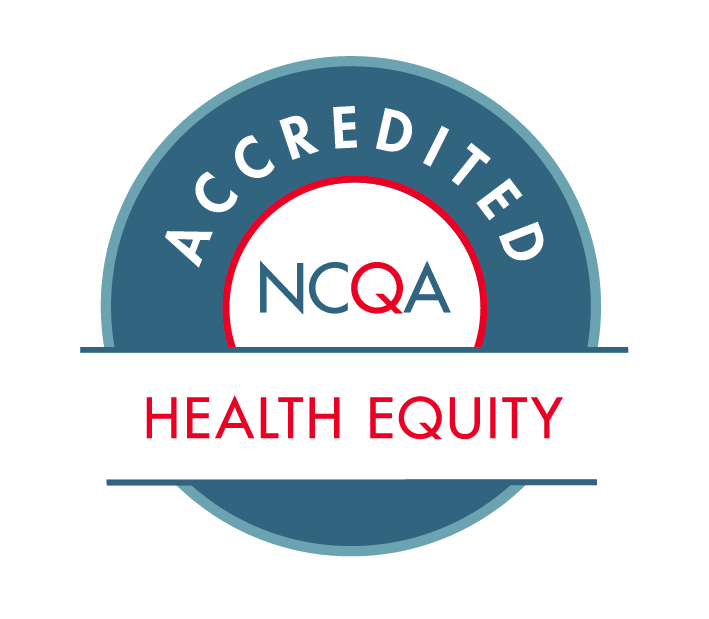High-quality care is equitable care.
Health directly relates to equitable care: Everyone deserves the best treatment regardless of their race, gender identity, sexual orientation, socioeconomic or cultural characteristics.
Health Equity
Quality health care has been historically unequal, often depending on a population’s race, culture, religion, class, gender identity, sexual orientation, geography or language.
Health equity is a commitment to provide high-level care to all populations and to remove obstacles and disparities in the health care system.
NCQA is committed to ongoing and evolving equity in health care.
Let’s take the journey together to achieve equitable health care for all Americans.
Our Commitment
Investigate
Be intentional in assessing and identifying areas with unwarranted differences while pointing out historical bias.
Illuminate
Listen and amplify the voices of underserved communities and identify ways to eliminate disparities.
Elevate
Promote actions that reduce disparities and propel health care toward true equity for everyone.
Our Impact
Explore how NCQA identifies inequalities and creates positive change.
Facing Inequitable Outcomes
Inequitable access to health care and social drivers of health results in significantly increased medical expenses each year, higher death rates in some communities and uneven distribution of resources.
How We Help
Health Systems
NCQA frameworks and programs help health systems identify disparities in care and close gaps in populations while supporting the priorities of contracting partners.
Health Plans
NCQA programs and measures help health plans implement an actionable framework to provide high-quality care for all members, determine how health inequities influence HEDIS® measures and outcomes, and meet contracting and regulatory requirements.
State & Federal Government
NCQA helps state and federal governments identify high-performing organizations and improve health equity in the community through accountability programs, quality reporting systems and custom research and analytic services.
Employers
Use NCQA programs to identify health plan and provider partners that excel in providing equitable health care with measurable outcomes, supporting equitable treatment to all employees.
Our Commitment to Health Equity Over Time
Learn about NCQA’s evolution to elevating health equity.
2010
NCQA launches its Distinction in Multicultural Health Care program.
HEDIS includes Diversity of Membership measures in MHC Distinction.
The California Endowment funds research to develop NCQA’s Multicultural Health Care standards and guidelines.
2014
NCQA receives a CMS Office of Minority Health contract to explore disparities in health care quality. NCQA also helps identify and develop measures for Culturally and Linguistically Appropriate Services for use in the Medicare QIO program.
2016
NCQA receives a CMS Office of Minority Health contract, the Health Equity Innovation Incubator, which brings together multiple stakeholders to examine potential disparities in care. One NCQA study highlights an unintended barrier to pain treatment for people with sickle cell anemia. Read more here.
2018
NCQA introduces socioeconomic status stratification for select HEDIS measures.
2021
NCQA aligns resources to create and promote a health equity strategy.
The Commonwealth Fund underwrites NCQA and Grantmakers in Health to create a roadmap to improve and sustainably collect data on race and ethnicity for policymakers and other audiences.
The California Endowment funds NCQA to develop health equity standards for health care delivery systems.
The California Health Care Foundation funds NCQA to expand health equity measurement for health care.
The Penn Center for Community Health Workers partners with NCQA to develop critical inputs to support successful community health worker programs
The National Academy of Medicine convenes NCQA and other prominent U.S. health care quality organizations to discuss and author a paper identifying key barriers and strategies to advance equity in health care quality.
2022
NCQA released Health Equity Accreditation Plus, a new program that builds on NCQA’s foundational Health Equity Accreditation by focusing on processes and cross-sector partnerships that help organizations identify and address social risk factors in the communities where they operate, and the social needs of the individuals they serve.
2023
NCQA continues its commitment to equity evolving and expanding gender identity and sexual orientation data and reporting racially and ethnically stratified HEDIS® measures across our accreditations.
Allies & Partners
We are grateful to our many colleagues and collaborators that share NCQA’s commitment to health equity.
Contributions and contributors shaping development of our measures and standards include:
- Health Equity Accreditation Public Comment: NCQA held a public comment forum to engage and receive feedback from the healthcare industry, helping shape NCQA’s Health Equity Accreditation standards and guidelines.
- HEDIS® Stratification Public Comment: In 2021, hundreds of colleagues advised us how to stratify HEDIS measures by race and ethnicity to help detect care disparities.
- Public Sector Advisory Council.
- Consumer Advisory Council.
- “9 health systems, plans earn new NCQA health equity accreditation targeting community partnerships.” Fierce Healthcare. October 5, 2022. https://www.fiercehealthcare.com/providers/health-plans-and-systems-earn-new-ncqa-health-equity-accreditation
- “Nine Organizations Earn Advanced NCQA Health Equity Accreditation.” healthleaders. October 3, 2022. https://www.healthleadersmedia.com/payer/ncqa-announces-first-nine-organizations-earn-advanced-health-equity-accreditation
- “NCQA Appoints Dr. Bryan O. Buckley as Director, Health Equity Initiatives.” GlobeNewswire. August 23, 2022. https://www.globenewswire.com/news-release/2022/08/23/2503095/0/en/NCQA-Appoints-Dr-Bryan-O-Buckley-as-Director-Health-Equity-Initiatives.html
- “Inside Health Care #86: Dr. Bryan O. Buckley on the Innovative Road to Health Equity.” Inside Healthcare Presented by NCQA. August 18, 2022. https://www.ncqa.org/blog/inside-health-care-86-dr-bryan-o-buckley-on-the-innovative-road-to-health-equity/
- “Shaping the future of public health: A conversation with emerging leaders.” Harvard T.H. Chan School of Public Health’s Leadership Studio. October 26, 2022. https://www.hsph.harvard.edu/event/shaping-the-future-of-public-health-a-conversation-with-emerging-leaders/
- “Five Volunteers Recognized for Outstanding Contributions that Save and Improve Lives.” American Heart Association – Eastern States. December 8, 2022. https://easternstates.heart.org/five-volunteers-recognized-for-outstanding-contributions-that-save-and-improve-lives/
- Buckley, B.O. & Paliani, S. “The Journey to Health Equity: Get Ready, Set, Go!” National Symposium, Food is Medicine Coalition, September 2022.
- Buckley, B.O. & Dunlap, N. “Highlight Discussion: The Federal Response to Health Equity.” Forum To Advance Health Equity in Medicare Advantage, Better Medicare Alliance, September 2022.
- Buckley, B.O. “The Journey to Health Equity: On your Mark, Get Set, Go!” 38th Annual Risk Managers’ Meeting, September 2022.
- Buckley, B.O., Whitcher, C., and Barrad, L. “Building Equity into Your System: A Pathway through Health Equity Accreditation.” HLTH, August 2022.
We also thank the funders that make it possible for us to develop standards and tools to eliminate disparities:
- Ani Turner, The Business Case for Racial Equity, A Strategy for Growth, W.K. Kellogg Foundation and Altarum, April 2018.
- U.S. Census Bureau, Projections of the Size and Composition of the U.S. Population: 2014 to 2060, March 2019.
- Cdc.gov. 2021. FastStats. [online] Available at: https://www.cdc.gov/nchs/fastats/black-health.htm.
- Cdc.gov. 2021. FastStats. [online] Available at: https://www.cdc.gov/nchs/fastats/black-health.htm.
- HEDIS® is a registered trademark of the National Committee for Quality Assurance (NCQA)








